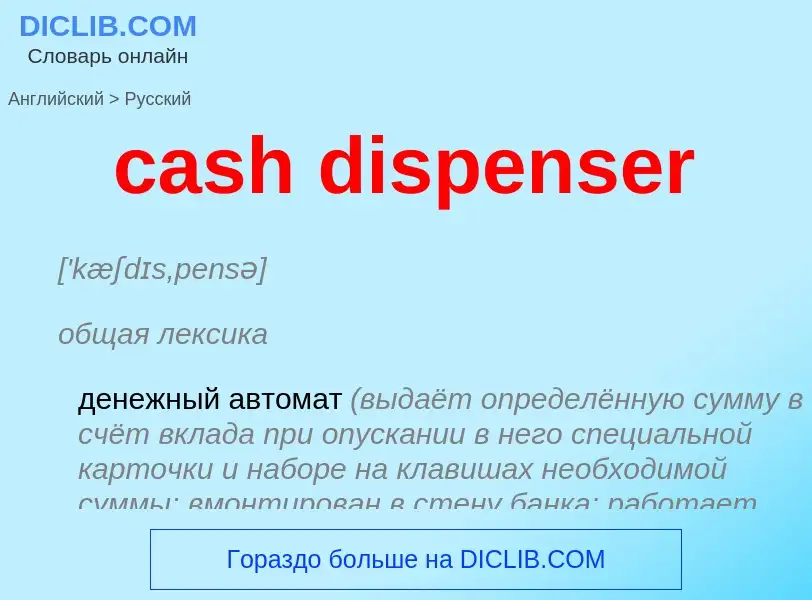Vertaling en analyse van woorden door kunstmatige intelligentie ChatGPT
Op deze pagina kunt u een gedetailleerde analyse krijgen van een woord of zin, geproduceerd met behulp van de beste kunstmatige intelligentietechnologie tot nu toe:
- hoe het woord wordt gebruikt
- gebruiksfrequentie
- het wordt vaker gebruikt in mondelinge of schriftelijke toespraken
- opties voor woordvertaling
- Gebruiksvoorbeelden (meerdere zinnen met vertaling)
- etymologie
cash dispenser - vertaling naar russisch
['kæʃdɪs,pensə]
общая лексика
денежный автомат (выдаёт определённую сумму в счёт вклада при опускании в него специальной карточки и наборе на клавишах необходимой суммы; вмонтирован в стену банка; работает круглосуточно)
кассир-автомат
автомат
выплачивающий наличными с банковского счёта (при опускании особой карточки)
существительное
общая лексика
кассир-автомат
Wikipedia
.jpg?width=120)
An automated teller machine (ATM) is an electronic telecommunications device that enables customers of financial institutions to perform financial transactions, such as cash withdrawals, deposits, funds transfers, balance inquiries or account information inquiries, at any time and without the need for direct interaction with bank staff.
ATMs are known by a variety of names, including automatic teller machine (ATM) in the United States (sometimes redundantly as "ATM machine"). In Canada, the term automated banking machine (ABM) is also used, although ATM is also very commonly used in Canada, with many Canadian organizations using ATM over ABM. In British English, the terms cashpoint, cash machine and hole in the wall are most widely used. Other terms include any time money, cashline, tyme machine, cash dispenser, cash corner, bankomat, or bancomat. ATMs that are not operated by a financial institution are known as "white-label" ATMs.
Using an ATM, customers can access their bank deposit or credit accounts in order to make a variety of financial transactions, most notably cash withdrawals and balance checking, as well as transferring credit to and from mobile phones. ATMs can also be used to withdraw cash in a foreign country. If the currency being withdrawn from the ATM is different from that in which the bank account is denominated, the money will be converted at the financial institution's exchange rate. Customers are typically identified by inserting a plastic ATM card (or some other acceptable payment card) into the ATM, with authentication being by the customer entering a personal identification number (PIN), which must match the PIN stored in the chip on the card (if the card is so equipped), or in the issuing financial institution's database.
According to the ATM Industry Association (ATMIA), as of 2015, there were close to 3.5 million ATMs installed worldwide. However, the use of ATMs is gradually declining with the increase in cashless payment systems.

.jpg?width=200)

![NCR]] Personas 75-Series interior, multi-function ATM in the United States NCR]] Personas 75-Series interior, multi-function ATM in the United States](https://commons.wikimedia.org/wiki/Special:FilePath/ATM 750x1300.jpg?width=200)

![Assortment of ATMs in [[Siam Paragon]] shopping centre, [[Bangkok]], [[Thailand]] Assortment of ATMs in [[Siam Paragon]] shopping centre, [[Bangkok]], [[Thailand]]](https://commons.wikimedia.org/wiki/Special:FilePath/ATM machines in Siam Paragon.jpg?width=200)
![Dunbar armored personnel watching over ATMs that have been installed in a [[van]] Dunbar armored personnel watching over ATMs that have been installed in a [[van]]](https://commons.wikimedia.org/wiki/Special:FilePath/ATMs In A Van.jpg?width=200)

![crashed]] due to a peripheral component failure crashed]] due to a peripheral component failure](https://commons.wikimedia.org/wiki/Special:FilePath/DeLaRue ATM Crash.jpg?width=200)
![A [[Diebold 1063]]ix with a dial-up modem visible at the base A [[Diebold 1063]]ix with a dial-up modem visible at the base](https://commons.wikimedia.org/wiki/Special:FilePath/Diebold 1063 ATM with modem.jpg?width=200)
![States of Jersey]] on the right States of Jersey]] on the right](https://commons.wikimedia.org/wiki/Special:FilePath/Dual currency cash machines in Jersey.jpg?width=200)
![Nixdorf]] ATM Nixdorf]] ATM](https://commons.wikimedia.org/wiki/Special:FilePath/Früher Bankautomat von Nixdorf.jpg?width=200)
![PIN]] card logo are not placed, although this system was in use here at the time. PIN]] card logo are not placed, although this system was in use here at the time.](https://commons.wikimedia.org/wiki/Special:FilePath/Geldautomaat.jpg?width=200)
![Gold vending ATM in [[New York City]] Gold vending ATM in [[New York City]]](https://commons.wikimedia.org/wiki/Special:FilePath/Gold-vending ATM in NYC.jpg?width=200)
![HSBC Express Banking ATM in, [[Shatin]], [[Hong Kong]] HSBC Express Banking ATM in, [[Shatin]], [[Hong Kong]]](https://commons.wikimedia.org/wiki/Special:FilePath/HSBC Express Banking in Shatin 2017.jpg?width=200)
![Smaller indoor ATMs dispense money inside [[convenience store]]s and other busy areas, such as this off-premises [[Wincor Nixdorf]] mono-function ICA ATM in [[Sweden]]. Smaller indoor ATMs dispense money inside [[convenience store]]s and other busy areas, such as this off-premises [[Wincor Nixdorf]] mono-function ICA ATM in [[Sweden]].](https://commons.wikimedia.org/wiki/Special:FilePath/ICAs uttagsautomat ICA Metro Skanstull Stockholm 2005-07-18.jpg?width=200)
![BTMU]] ATM with a [[palm scanner]] (to the right of the screen) BTMU]] ATM with a [[palm scanner]] (to the right of the screen)](https://commons.wikimedia.org/wiki/Special:FilePath/Japanese ATM Palm Scanner.jpg?width=200)

![A [[Wincor Nixdorf]] ATM running [[Windows 2000]] (system screen removed due to copyright infringement) A [[Wincor Nixdorf]] ATM running [[Windows 2000]] (system screen removed due to copyright infringement)](https://commons.wikimedia.org/wiki/Special:FilePath/Postomat-Windows-p1020441.jpg?width=200)
![A [[Wincor Nixdorf]] Procash 2100xe Frontload that was opened with an [[angle grinder]] A [[Wincor Nixdorf]] Procash 2100xe Frontload that was opened with an [[angle grinder]]](https://commons.wikimedia.org/wiki/Special:FilePath/Procash stolen 1.jpg?width=200)

![Actor [[Reg Varney]] using the world's first cash machine in [[Enfield Town]], north London on 27 June 1967 Actor [[Reg Varney]] using the world's first cash machine in [[Enfield Town]], north London on 27 June 1967](https://commons.wikimedia.org/wiki/Special:FilePath/RegVarneyATM.jpg?width=200)
![tampering]]. tampering]].](https://commons.wikimedia.org/wiki/Special:FilePath/Tamper warning on ATM in London.jpg?width=200)
![REI]] REI]]](https://commons.wikimedia.org/wiki/Special:FilePath/Two Loomis Employees Refilling an ATM at the Downtown Seattle REI.jpg?width=200)
![Windows XP]], as seen with this machine at a branch of [[Tesco Express]] in [[Slough]], Berkshire. Windows XP]], as seen with this machine at a branch of [[Tesco Express]] in [[Slough]], Berkshire.](https://commons.wikimedia.org/wiki/Special:FilePath/Windows XP sighted 'in the wild' on a cash point, 3 August 2018.jpg?width=200)
![magazine=[[Atlas Obscura]]}}</ref> magazine=[[Atlas Obscura]]}}</ref>](https://commons.wikimedia.org/wiki/Special:FilePath/World's Highest ATM.jpg?width=200)

![Sberbank]] ATM in [[Tolyatti]], [[Russia]] Sberbank]] ATM in [[Tolyatti]], [[Russia]]](https://commons.wikimedia.org/wiki/Special:FilePath/Банкомат Сбербанка.jpg?width=200)
